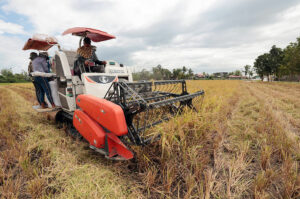By John Victor D. Ordoñez, Reporter
CONGRESS late Wednesday ratified the bicameral conference committee report on a bill seeking to raise the yearly allocation of the Rice Competitiveness Enhancement Fund (RCEF) to P30 billion from P10 billion until 2031.
The measure coming out of bicam, which harmonized Senate Bill No. 2779 and House Bill No. 10381, also requires the National Food Authority (NFA) must maintain a rice reserve equivalent to at least 15 days’ demand, according to the bicam report sent to BusinessWorld on Thursday.
The measure would also give the Department of Agriculture (DA) the authority to sell NFA rice reserves in times of shortage and high rice prices to the Department of Social Welfare and Development (DSWD), Office of Civil Defense, local government units (LGUs), and the KADIWA network of stores that sell government-subsidized goods.
The measure amends the Rice Tariffication Law of 2019 or Republic Act No. 11203. RA 11203 opened up to private entities the rice import trade, which had previously been dominated by the NFA, which imported the grain via government-to-government deals. The private traders instead had to pay a tariff of 35% on their shipments of Southeast Asian grain. The tariff has since been reduced to 15% and applies to rice from all sources.
According to the bicam report, the Secretary of Agriculture will be given the authority to designate importing entities during times of “extraordinarily” high prices. The NFA remains barred from importing rice.
Under the reconciled version of the bill, the importing entity is required to ship rice at least cost following the conclusion of government-to-government supply agreements.
It also requires the DA to maintain a rice buffer fund of P5 billion during food security emergencies.
The P30-billion RCEF allocation will fund the development of high-quality inbred rice seed, the distribution of cash aid for farmers, and the construction of solar-powered irrigation systems and composting facilities.
Rice tariff collections amounted to about P30 billion last year, according to the Bureau of Customs.
The 2019 law also restricted the NFA to buying domestic grain to maintain an emergency reserve of rice for use during calamities.
